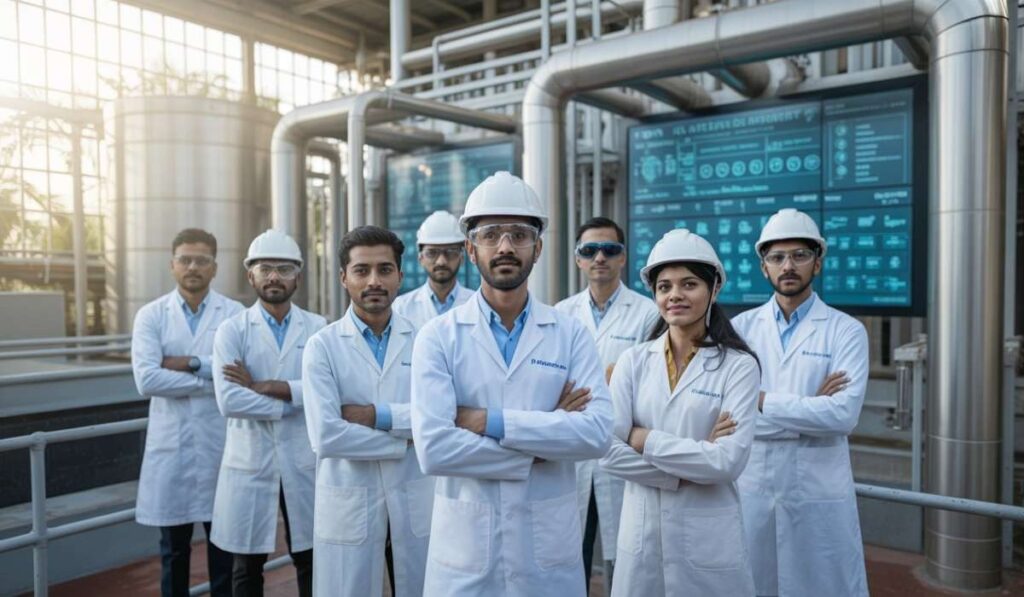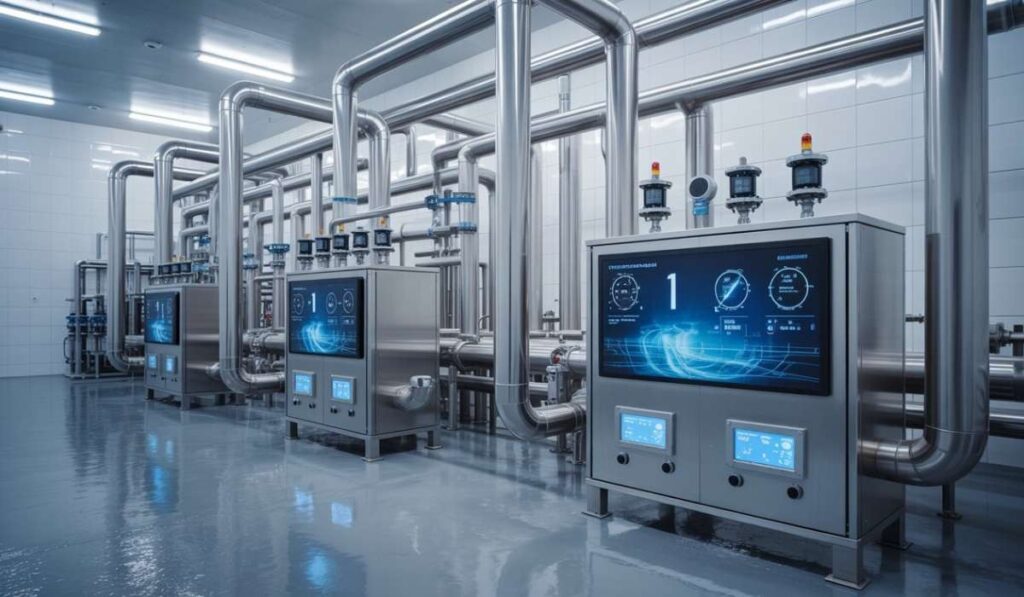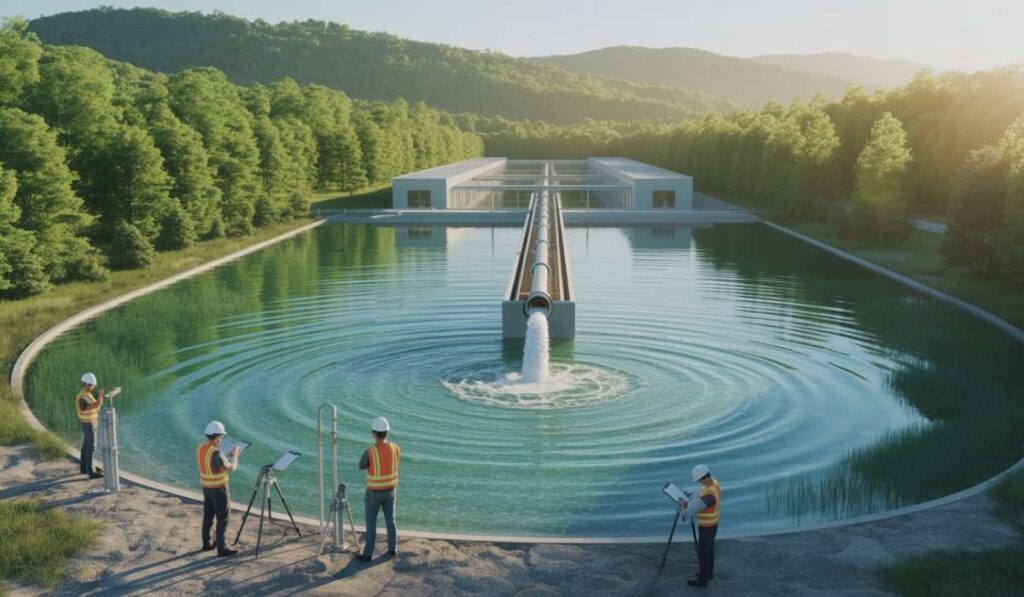-
Email us at:
info@weltreatsystems.com -
Call us on:
020 - 41228334 - Download Brochure

25
Oct 25Water is life. Yet in a rapidly industrializing nation like India, this precious resource is slipping through our fingers—polluted, wasted, and disappearing faster than we can replenish it. Industries grow, cities expand, and beneath it all runs a silent crisis: the contamination and depletion of our water sources. But what if there was a way to turn the tide? What if engineering could meet empathy, and innovation could answer urgency?
This is the story of Weltreat Systems, a Pune-based champion in the world of water and wastewater treatment. It’s not just a tale of technology and plants—it’s about people who believed that every drop matters, and that sustainable solutions aren’t just good business, they’re essential for survival.

The Beginning: A Vision Born from Concern
Every great journey begins with a moment of realization. For the founders of Weltreat Systems, that moment came while witnessing the industrial boom across Maharashtra. Factories were thriving, jobs were being created, and the economy was humming. But so was something else—untreated effluent flowing into rivers, groundwater turning brackish, and communities downstream paying the price.
The founders, engineers by training and environmentalists at heart, asked themselves a simple question: Can industrial progress and environmental responsibility coexist?
The answer was yes—but only if someone stepped up to make it happen.
In the early 2000s, armed with technical expertise and a deep sense of purpose, Weltreat Systems was born in Pune. It wasn’t about chasing profit margins; it was about solving a problem that mattered. As a fledgling water treatment company in Pune, they started small—consulting for local industries, designing basic treatment systems, and learning the ropes of a business that was equal parts science, service, and perseverance.
The Turning Point: Earning Trust, One Plant at a Time
The early years weren’t easy. Competition was fierce, clients were skeptical, and convincing factory owners to invest in effluent treatment plants (ETP) required more than just technical prowess—it required trust.
Their first major breakthrough came when a mid-sized textile manufacturer in Pune approached them with a challenge: their existing wastewater system was failing audits, and they were facing regulatory action. The clock was ticking.
Weltreat didn’t just deliver a solution—they delivered hope. Within months, they designed and commissioned a customized ETP that not only met compliance standards but exceeded them. The treated water was clean enough to be reused in non-critical processes, saving the client thousands of liters daily and cutting operational costs.
Word spread. One success story led to another. Industries began to see Weltreat not as a vendor, but as a partner in sustainable water management. That textile plant became a case study. That case study became a reputation.

Technology with Purpose: Innovation Meets Impact
As Weltreat grew, so did their ambition. They realized that India’s water challenges required more than cookie-cutter solutions. Every industry had unique needs—different pollutants, different volumes, different goals. So they invested in research, collaborated with environmental scientists, and built a team that could think beyond the manual.
Their portfolio expanded to include cutting-edge wastewater treatment solutions: Reverse Osmosis (RO) systems that purified water to near-drinking standards, advanced ETPs that handled complex chemical effluents, and Zero Liquid Discharge (ZLD) systems that took sustainability to its logical extreme—zero waste, total recovery.
But here’s what set Weltreat apart: they never forgot the human element. Every plant they designed was built with the operators in mind—simple to maintain, energy-efficient, and reliable. They trained staff, provided after-sales support, and stayed connected long after the project was commissioned.
In an industry often criticized for being transactional, Weltreat chose to be relational.
Growing with Purpose: Industries Served, Lives Touched
Over the years, Weltreat Systems evolved from a local player into a trusted name across sectors. Pharmaceutical companies turned to them for ultra-pure water systems. Chemical manufacturers relied on their expertise in handling hazardous effluents. Textile units, food processing plants, and even hospitals began installing their industrial wastewater treatment solutions.
Each project told a story. A dairy plant in Ahmednagar that reduced its freshwater consumption by 40%. A chemical factory in Satara that achieved zero discharge, protecting the nearby river that entire villages depended on. A hospital in Pune that ensured its medical waste didn’t contaminate public water supplies.
These weren’t just engineering wins—they were environmental victories. They were proof that with the right systems, industries could thrive without compromising the world around them.
And the numbers spoke volumes: millions of liters of water recycled annually, countless tons of pollutants removed before they could reach natural water bodies, and industries transformed from environmental liabilities into responsible corporate citizens.
Challenges and Lessons: The Road Less Traveled
But no journey worth telling is without its obstacles. Weltreat faced its share of setbacks—projects delayed by regulatory hurdles, clients who prioritized short-term costs over long-term sustainability, and the constant challenge of keeping pace with evolving environmental norms.
There were moments of doubt. Times when the easier path would have been to compromise, to cut corners, to prioritize volume over values. But the team held firm. They learned that true success isn’t measured in quarterly profits—it’s measured in rivers that run cleaner, groundwater that regenerates, and communities that breathe easier.
Every challenge became a lesson. Every failure became fuel. And through it all, one principle remained unchanged: water is too precious to waste, and too vital to pollute.
A Mission for Tomorrow: Beyond Business, Toward Legacy
Today, as India races toward its sustainability goals and global attention turns to water recycling systems and climate action, Weltreat Systems stands at the forefront of a movement. They’re not just selling equipment—they’re advocating for a mindset shift.
Their vision extends beyond Pune, beyond Maharashtra, beyond profit. They dream of an India where every industry operates responsibly, where Zero Liquid Discharge (ZLD) systems become the norm rather than the exception, and where future generations inherit rivers that flow clear and aquifers that run deep.
They’re collaborating with policymakers, educating young engineers, and pushing the boundaries of what’s possible in wastewater treatment. Because for Weltreat, this was never just a business—it was a calling.
Engineering Hope, One Drop at a Time
Water scarcity is one of humanity’s defining challenges. But it’s also one of our greatest opportunities—to innovate, to collaborate, and to prove that we can build prosperity without destroying the planet.
Weltreat Systems embodies that possibility. From a modest beginning in Pune to becoming a recognized leader in sustainable water solutions, their journey reflects what happens when purpose meets persistence. They’ve shown that a water treatment company in Pune can think globally, act locally, and inspire universally.
If you believe in responsible water management, and if you’re looking for partners who bring both expertise and empathy to the table, explore what Weltreat Systems has to offer. Because the future isn’t just about surviving the water crisis—it’s about engineering a better tomorrow, one drop at a time.
Visit Weltreat Systems to learn more about their innovative solutions and join the movement toward sustainable water management.

FAQ: Understanding Water and Wastewater Treatment
What is Zero Liquid Discharge (ZLD) and why is it important?
Zero Liquid Discharge is an advanced wastewater treatment process where all wastewater is treated and recycled, leaving no liquid waste to be disposed of. It’s important because it minimizes water consumption, eliminates pollution, and helps industries comply with stringent environmental regulations while achieving sustainability goals.
How do effluent treatment plants (ETPs) work?
Effluent treatment plants use a combination of physical, chemical, and biological processes to remove contaminants from industrial wastewater. The treated water can then be safely discharged or reused, reducing environmental impact and freshwater consumption.
Why should industries invest in wastewater treatment solutions?
Beyond regulatory compliance, wastewater treatment reduces operational costs through water recycling, protects the environment, enhances corporate reputation, and contributes to long-term sustainability. It’s an investment in both business continuity and social responsibility.
What industries benefit most from industrial wastewater treatment systems?
Industries with high water consumption or pollutant generation—including pharmaceuticals, textiles, chemicals, food processing, and manufacturing—benefit significantly from customized wastewater treatment systems that enable recycling, compliance, and cost savings.
